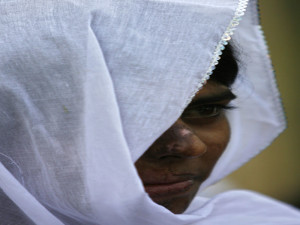Iftikhar Hussain
As the world marked the International Day for the Elimination of Violence Against Women, three women workers on an anti-polio campaign were gunned down in the southwestern city of Quetta, in what appears to be another challenge in Pakistan’s growing list of women’s rights issues. Pakistani women are already up against high odds: honor killings, acid attacks, domestic violence and a lack of implementation of laws regarding the women rights, are just some of the issues.
Among incidents of violence against women, attacks with acid are gruesome. They leave women with disfigure bodies, scars and life-long emotional and psychological trauma.And acid violence against women has increased in recent months. Aurat Foundation, an organization campaigning for women rights in Pakistan, says in a recent report that police have reported 59 cases of attacks with acid between January and the middle of October this year. Most of the cases were from Punjab, the country’s most populous province.
Acid attacks are common in Pakistan: Scores of such assaults take place each year. The Aurat Foundation report indicates a 12 percent decrease in acid-throwing incidents in Pakistan in 2012 as compared to 2011. The group’s reports, released each year, show that a total of 7516 cases were reported in 2012 as compared to the 8539 cases reported in 2011. Some 8000 acid-throwing cases were reported in 2010, 8548 cases in 2009 and 7571 in 2008, respectively.
Reasons behind the acid attacks: Acid is used as a means of violence for a variety of reasons, says Malik Asim, of the Aurat Foundation. In some instances a man whose love has been spurned attacks a woman with acid and in other instances acid has been used as a weapon in domestic disputes, in cousin rivalries or in disputes over property, Asim says.
Lack of Implementation of Laws On Women’s Rights: A former judge and human rights activist in Pakistan’s north western province of Khyber Pakhtunkhwa, Sher Muhammad Khan, told VOA Deewa, Pakistani society is a feudal one, women are considered personal properties and they are treated like “sheep and goats.” When law enforcement agencies fail to implement laws, the result is a rise in crimes against women, he says.
Role of clerics in improving women status: Miraj Humayoun, a female lawmaker in Khyber Pakhtunkhwa provincial assembly laments lack of political will on part of the country’s legislators to protect women rights. Talking to VAO Deewa, She called on religious clerics to end anti-women rhetoric. “Mullahs should talk on women rights in every Friday sermons”, she suggested.
Religious perspective on acid throwing against women: A religious scholar Dr. Zahid Shah told VOA Deewa Islam out rightly rejects such crimes against women. He said, “Unlike the anti-women practices in Pakistan, Islam protects women rights and calls for a rebellion against a state which fails to protect its womenfolk.”
Not only the issues they face to be resolved, half of Pakistan’s 180 million population feels marginalized in every field of life. In Pakistan patriarchal society, men usually head the family and thus assume the role of a decision maker for the family, leaving women with virtually no public voice. Though concerns for women independence runs high in public debates, but despite that fewer Pakistani men of the conservative Islamic society are seen part of the campaign for women rights.
Irrespective of when women rights laws get implemented or general social attitude toward women change, Asim Malik says that the scars of violence remain long lasting. “Every victim has her own story of shattered dreams and dashed hopes,” he said.
He says violence against women resonates strongly and spread fear.
| Older: Four Sentenced to Death in Pakistan in ‘Honor Killing’ | Newer: Malala Message: “Our voices have grown louder and louder.” |
Violence against Women; Pakistani women strugles with their own odds
Posted November 26th, 2014 at 7:09 pm (UTC+0)
Leave a comment
| Older: Four Sentenced to Death in Pakistan in ‘Honor Killing’ | Newer: Malala Message: “Our voices have grown louder and louder.” |
